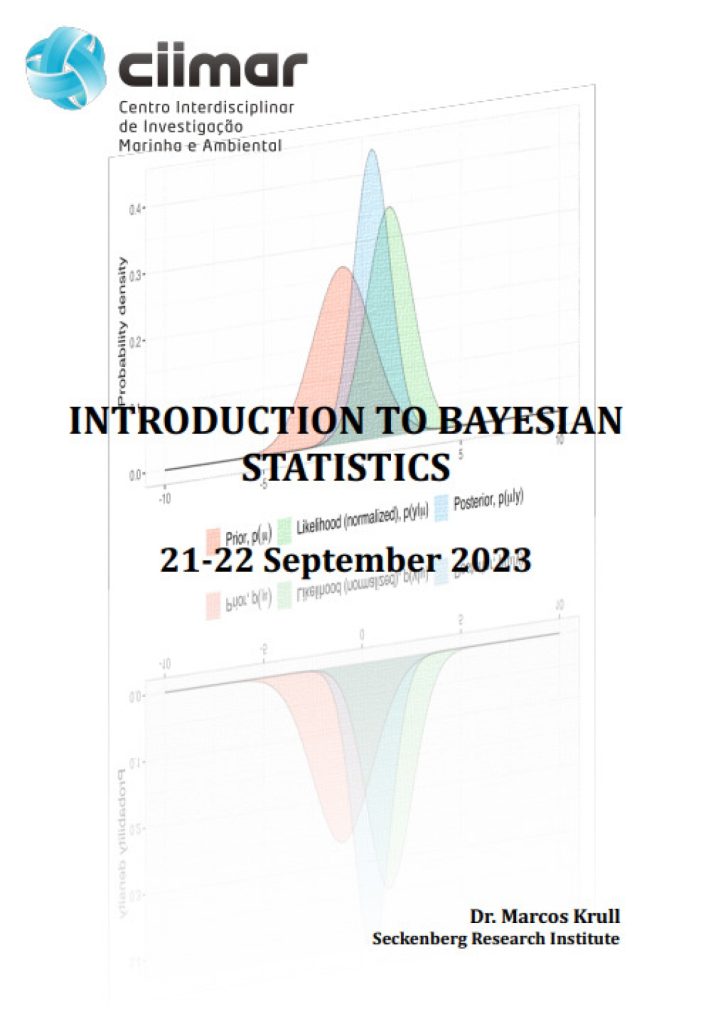Introduction to Bayesian Statistics | Dr. Marcos Krull

Introduction to Bayesian Statistics
CIIMAR, 21-22 September 2023
Course description
In recent decades, there has been a growing awareness of the limitations of null hypothesis testing and frequentist statistics. In this context, Bayesian statistics has once again proven to be a powerful alternative for scientific inference. This course introduces Bayesian statistics and covers the basics of Bayes’ theorem up to its practical application in data analysis. Although a basic understanding of mathematics is helpful, the emphasis of this course is on developing a comprehensive understanding of key Bayesian principles, interpreting results, and performing Bayesian analysis. Throughout the course, a comparative analysis between Bayesian and frequentist approaches will be conducted, exploring the respective advantages and disadvantages of each. To fully benefit from this course, participants should have a basic knowledge of the R environment. By the end of this course, you should have a solid understanding of Bayesian concepts, a clear understanding of the differences between Bayesian and frequentist inference, and the ability to effectively analyze and interpret data using Bayesian methods.
Course Program (9h – 18h)
1. Introduction: Historical context and conditional probability
– Fisher, Neyman-Person and Bayesian framework
– Bayes’ theorem
2. Likelihood, priors and posterior distributions
– Definition of likelihood and maximum likelihood estimation
– Types and choices of priors
– Joint, marginal and conditional probability
3. Monte Carlo Markov Chains (MCMC)
– History, development and application of MCMC sampling
– Metropolis, Gibbs sampler and Hamiltonian algorithms
– MCMC convergence
– The Stan language
4. Linear models
– ANOVA
– Regression
– ANCOVA
– Hierarchical (mixed) models and variance-covariance modeling
5. Hypothesis testing and model selection in the Bayesian framework
– Bayes factors, evidence ratios, credible intervals and ROPE
– Watanabe Information Criteria (WAIC) and leave-one-out cross validation (LOO)
6. Generalized linear models
– Logistic regression
– Poisson regression and negative binomial
7. Non-linear models
– von Bertalanffy growth model
– Michaelis-Menten kinetic model
8. Should I become Bayesian?
– Differences between frequentist and Bayesian inference
Instructor: Dr. Marcos Krull. Seckenberg Research Institute and Natural History Museum, Frankfurt (Germany)
Prerequisites
– Introduction to the R environment
– Basic statistics
Registration information:
The registration fee is 30 €.
Registration, together with the payment information, is available through the LINK . Registration becomes effective after you complete the online registration form available in the previous link and send proof of payment to the e-mail address abarreiro@ciimar.up.pt
There are 20 places available.
Instructor
Dr. Marcos Krull graduated in Biology and obtained a Master of Science in Ecology and Biomonitoring at the Federal College of Bahia (Brazil) between 2004 and 2011. From 2014-2019, he completed his PhD in Marine Sciences at the Virginia Institute of Marine Sciences (USA). He is currently a postdoctoral researcher at the Seckenberg Research Institute (Germany). He specialized in the research field of Ecotoxicology, working mainly with intertidal aquatic invertebrates. During his career, he developed extensive skills in the use of statistical and modeling tools, which he applied to the study of the combined effects of contaminants and habitat fragmentation on invertebrate ecophysiology, behavior, and population dynamics. This work is reflected in numerous publications in prestigious international journals, books, book chapters, and extensive teaching experience in various institutions in Brazil, the USA, and Germany.
Website by: Glitz Design